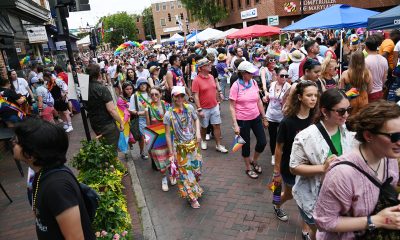Opinions
The tumultuous relationship between queers and religion
One lesbian’s story offers a glimmer of hope
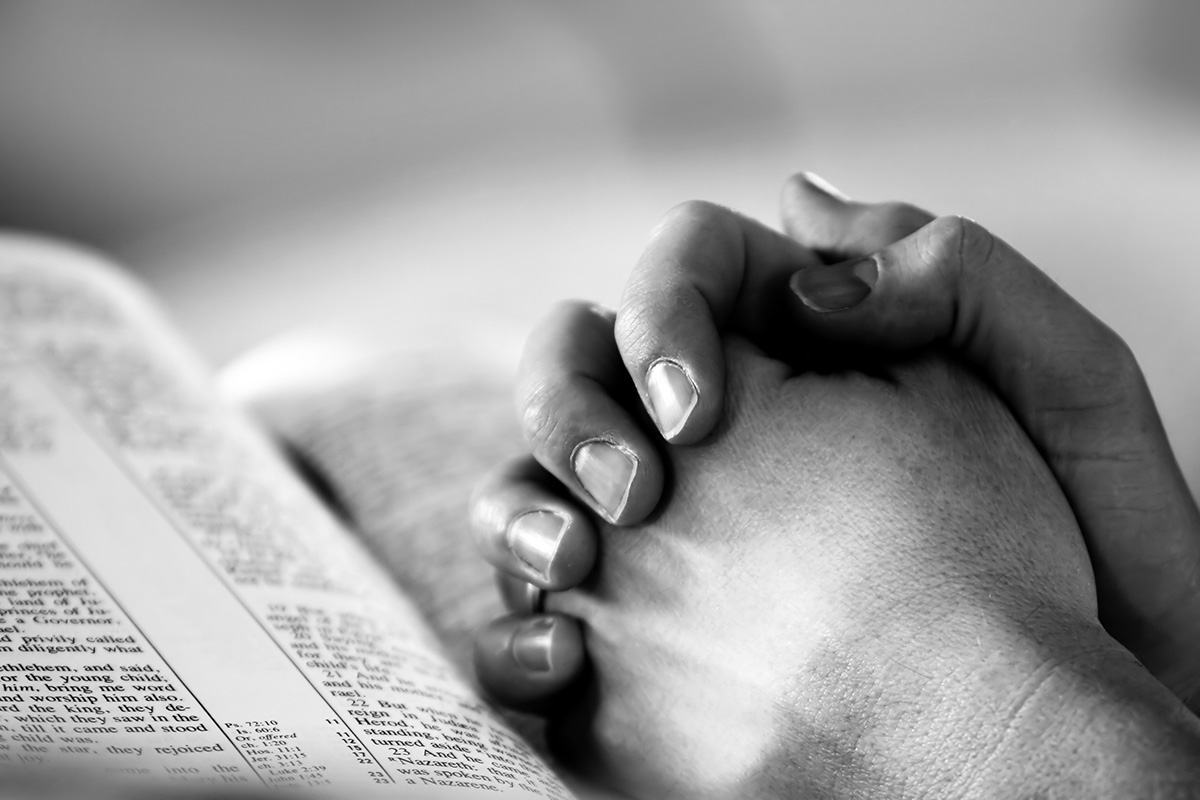
It was a hot, humid Sunday in the middle of July when my ex suddenly crossed my mind. Of course, it didn’t help that it was his birthday, just like it didn’t help that I was sitting idly outside the bar since our bouncer was running late. It all made the perfect storm for some tortured self-reflection.
Thank God (pun intended) Alexa walked outside in that moment. Alexa was a bartender, and I’m certain all our staff would agree her mere presence brightened the business. Years of bartending rendered her with a keen sense of reading people, so it didn’t take long for her to inquire what was on my mind.
So, I let it all spill out. I explained he was no ordinary ex, for he was the first person I truly fell in love with. I recounted our days on end enjoying each other’s company, and how it always felt so easy, and never like a performance. There was, however, a teeny, tiny problem that later turned into a big problem: He was closeted.
It’s a tale as old as time, I suppose — queer self-rejection in the name of religion. In this case, my ex grew up Evangelical, resulting in an existential crisis that broke both of our hearts. Perhaps the right question, though, is why was I surprised? After all, the queer relationship with God has always been tense for reasons so obvious I don’t need to spell them out here.
Despite being obvious, it seems backwards, doesn’t it? Weren’t anti-gay religious biases so last millennium? Yet if the 2024 election was any indication, the unfortunate answer is no. Today religion still serves as the backdrop for anti-LGTBQ legislation, policy, and rhetoric. In fact, I often see fellow millennials, some of whom I grew up with, profess religious beliefs on social media. Many are parents who fear LGBTQ inclusion being taught in schools so much that they now home school their children to shield them from it.
Because of all this damn religion, I sat there brokenhearted, reminiscing on the love I lost. Alexa, meanwhile, listened intently throughout, and once I finished she told me she could relate. When I asked how, she replied, “I used to be a worship leader.”
To say you could have knocked me over with a feather would be an understatement. How someone goes from that to a proudly out bartender at a gay bar was a story I had to hear.
“I was going through a really low point in life,” she started, “and I turned to God and to Christianity to help me out of it. I had a sense that I needed to give up my lifestyle and ways to follow what I believed at the time that God had for me. This included turning away from my identity as a lesbian.
“I played into a lot of rhetoric that I thought was good and pure at the time but was slowly killing me on the inside. This mostly had to do with my sexuality. I believed for so long that being a lesbian was a sin and I couldn’t be in a loving relationship with a woman and God at the same time. However, as I became more depressed and in turmoil over this, I prayed and fasted for the desire to be lifted, so I began to dig deeper.”
Already I could spot similarities with my ex. While I didn’t grow up religious, coming out was still hard. I couldn’t imagine the thought of mortal sin hanging over me as I tried.
“I was involved in a high control group that made me mistrust myself,” Alexa continued. “They were controlling in a subtle way that ultimately led me to fear. I think that queers learn not to trust their instincts when it comes to how they naturally feel. Specifically, certain groups of Christianity teach that being queer is unnatural and an abomination to God. Though the term abomination is also highly misused, we understand it to mean the worst thing you could do against God, so we learn to go against our nature and to repress our feelings and to fight them as an attack of the enemy (the devil).
“This causes you to lose a sense of autonomy and a sense of self. You no longer can trust yourself to decide what is good, or natural, or right. That mistrust can easily lead you down a road where others take advantage and take that authority over you. This is how we see religious leaders get away with abuse. Though this doesn’t just apply to queer people. This can happen to anyone.”
I had been so angry with my ex when he chose scripture over us. Alexa’s perspective made me realize how unnecessary that was, since he was already angry at himself. My thoughts also swirled to friends who grew up in strict religious households. Amid all the types of queer trauma, religious trauma is a different beast. The tactics used to manipulate young minds are harsh, and even dangerous.
We ought to wonder how far any religion is willing to go to fight homosexuality from within. If sexual abuse was uncovered in one popular sect of Christianity, it’s probably further than we think. These queers are often trapped by an institution so set on keeping them straight, it costs them their truest self. This, in turn, catapults them into a crisis so deep, not all escape.
But Alexa did, so I had to ask how.
“I studied more,” she replied. “I looked at the scriptures dealing with this and discovered that they’d been translated within an agenda and cultural context that didn’t match what I was dealing with. The story of Soddom and Gomorrah, the mistranslation of homosexuality in the New Testament, etc. I began looking at the Bible differently — as less of the exact words that God spoke and as more of man’s interpretation of the world and God. I don’t claim to be a biblical scholar but the more I studied the more I saw that I was placing unnecessary restrictions on myself for the sake of man and not for the sake of my relationship with God.”
This I found most fascinating — that Alexa found her freedom not by hiding her orientation nor by suppressing her spirituality but rather by leaning into both.
It’s easy to presume God and homosexuality are diametrically opposed, but that would be an oversimplification. I mean, look around: there are churches throughout D.C. embracing pro-LGBTQ messages. Instead of scaring queers toward or away from religion, perhaps we ought to give them space to embrace both.
Alexa explained it well: “I wonder sometimes if I like the God of the Bible. There are so many things He proclaims, requires, and stands for that I don’t morally agree with. Though there are many things I have learned from Jesus that I would say kind of correct some of that. The Jesus that fought for the outcasts and helped them. Who advocated for the poor. Who recognized that piety and character are not always synonymous.”
I now see queers closeted by religion differently. No longer can I consider them cowardly, for they experience the worst torture of us all: sinister manipulation breeding deep inner conflict. Not only does my ex not deserve my anger, but he also deserves my empathy.
I asked Alexa’s advice to queers experiencing what she went through.
“Let the pressure go,” she replied. “That’s easier said than done. Especially if your whole existence is tied up in it. However, you really have to ask yourself who you are, what you believe, and what you’re willing to live and die for. In my experience being closeted especially due to religious pressure is a silent killer. The stress your body goes through kills you from the inside and may ultimately lead to risky and deadly decisions. It can not only hurt you but those around you.”
She didn’t need to share details, since when I last checked on my ex, I learned he fell into hard times. As painful as that is, at least I know a happy ending is still possible for him.
A few months after our conversation, Alexa married the love of her life. In fact, she and her wife had their reception in the bar, so I had the privilege of seeing how happy she is. Knowing her journey made it that much sweeter.
And just last week, Alexa gave birth to their son. He’s a lucky kid, for he has two wonderful parents who love him very much.
Alexa’s story is an important one. It details the lengths religious institutions are willing to go to suppress homosexuality. It reveals the internal strife religious queers still experience. Most importantly, though, it’s the story of a young, queer woman who found strength in her queer self through her personal relationship with God. It’s a story I’ll keep close to my heart, especially at this time of year — one that provides that glimmer of hope I need now more than ever.
In other words, her story gives me faith.
Jake Stewart is a D.C.-based writer and barback.
Opinions
Virginia 2025 GOP ticket gives DEI a bad name
John Reid’s views on trans issues are repugnant
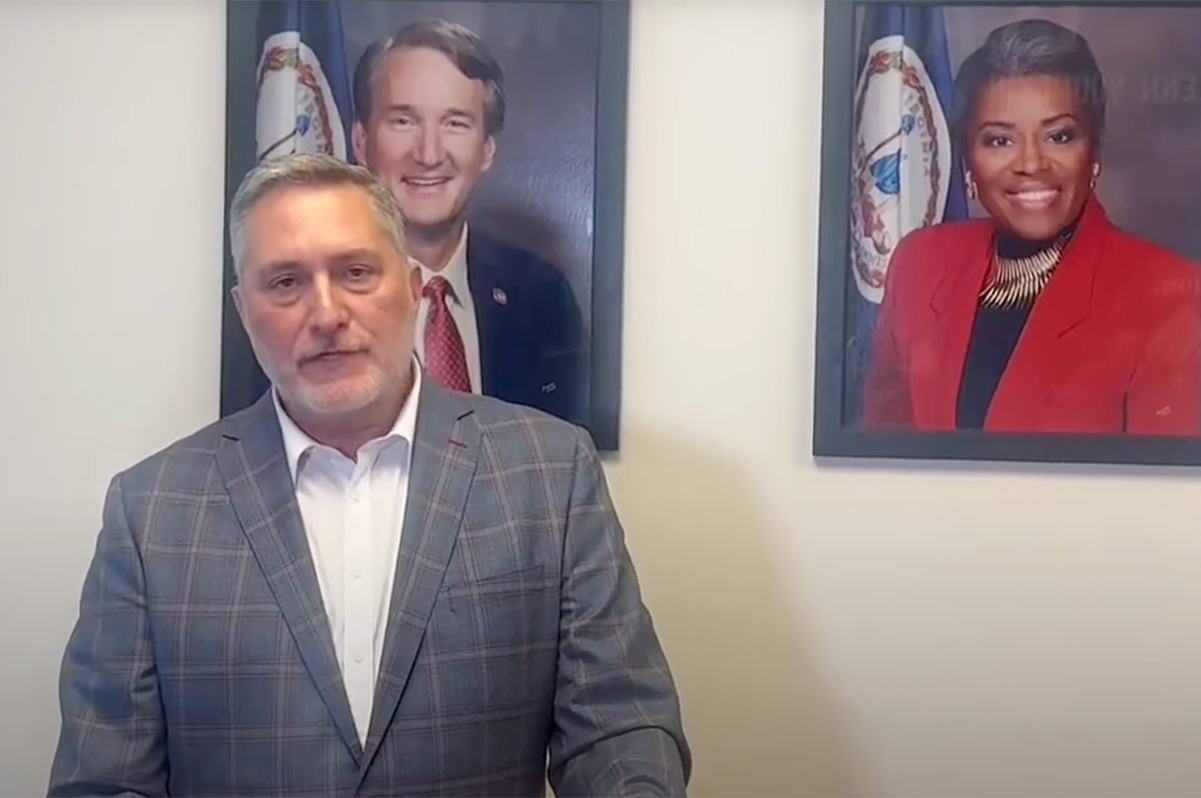
The GOP ticket up for election in Virginia in 2025, is trying to prove DEI is bad. The ticket is Black, gay, and Latino and supports the racist, homophobic, misogynist, found liable for sexual assault, felon, in the White House.
There is all of this hullabaloo created by MAGA Virginia Gov. Glenn Youngkin about John Reid, the gay member of the DEI team, running for lieutenant governor, being on a porn site, or sending out pornographic material. There is no indication this is true, or if it is, that it was in any way illegal. There is most likely no young person today, straight or gay, who hasn’t visited a porn site — and not only young people. It is Reid’s own business. The issue for me is Youngkin and his aides, making this about Reid’s sexual orientation. That is despicable, but I would expect nothing less from this governor.
Clearly, I have no problem with Reid being gay. But it’s sad to see all the homophobic Republicans getting themselves in a twit over this. The reality is there are so many other things for decent people to be bothered about when it comes to John Reid’s candidacy. His stated views on so many areas are disturbing. His clear disdain for the trans community is offensive. His use of the term ‘wokism,’ which he, like so many other Republicans who use it, never explain what the hell it means to them.
Then I am always amazed when a member of a minority, thinks it’s OK to attack another minority. In Reid’s case it is surely a sign of a lack of self-worth. In any event, it is really disgusting. That is only the beginning of the issues I have with Reid. On his website Reid states “He believes we should prioritize first-class learning in education, free from leftist indoctrination.” What does that mean? Does it include banning gay-themed, and African American history books, among others, from school libraries? He says he is “dedicated to safeguarding and gaining knowledge from our heritage, rather than obliterating it. He appreciates the significance of our history and will always advocate for conserving our cultural landmarks and enlightening future generations about the foundation of our nation.”
Does that mean keeping up Confederate statues or using Confederate names for public institutions? Reid says “he is focused on stopping the divisive wokeness and bringing Virginians together on common values for a stronger future.” He claims to be “uniquely positioned to take the fight to the radical progressives head-on as he continues his fight against boys in girls’ sports, and the extreme trans-agenda being forced upon our children.” He calls that “common sense values.” I don’t think most of that would seem like common sense to any decent person.
He says, “You know best how to live your life and will fight to allow adults to make their own decisions without government intervention.” That is except for trans people, a woman who wants to control her own body, and healthcare, and anyone else he disagrees with.
He also says “we all must pay our own bills and personally own and be responsible for the consequences — good and bad, of our decisions.” Does that mean he opposes Medicaid, any government assistance for the poor, government sponsored pre-school, aid for childcare, or even assistance from a church or community group?
Then there is his full-throated support for Jason Miyares running on the ticket for attorney general, and Winsome Earle-Sears, the candidate for governor, both MAGA Republicans like himself, all giving their mutual strong, blind support, to the felon, racist, homophobic, misogynist, found liable for sexual assault, liar, in the White House. They continue to support him as he, and his Nazi sympathizing co-president, fire thousands of Virginians, including veterans, who fought, and were willing to risk their lives, for our country. They all support the felon as he slashes medical research programs for children. The felon who is cutting hot lines for the LGBTQ community to reach out if they have mental health issues. The felon who is cutting HIV/AIDS research, and hundreds of other grants, at NIH, dedicated to improving the health of the LGBTQ community, along with other programs the felon has cut, which will lead to more deaths around the world from polio and malaria. This is the GOP ticket in Virginia in 2025.
For the good of Virginians, and the nation, vote for Abigail Spanberger for governor, and the entire Democratic ticket, up and down the ballot.
Peter Rosenstein is a longtime LGBTQ rights and Democratic Party activist.
Opinions
The power of queer community: When aid is cut, we don’t disappear. We organize
US funding withdrawal has had global impact

The global LGBTIQ+ movement is being systematically undermined, not just by eroding legal protections and escalating political harassment, but by the sudden withdrawal of vital funding. What began in the U.S. as a flurry of policy changes under Donald Trump has become a global flood of cuts, bans, and deliberate dehumanization. This week in Nairobi, prominent ultra-conservative campaigners from around the world, who are against abortion, transgender and LGBTIQ+ rights, and sexuality education, are speaking at the Pan-African Conference on Family Values.
Grassroots organizations, which are the backbone of queer survival and resistance around the world, are struggling to stay afloat. The global funding squeeze will and has already started to directly impact frontline organizations, forcing them to scale back, shut down programs, or close entirely.
In South Africa, support groups have slashed services due to the sudden disappearance of U.S. aid. In Mali, new laws criminalize LGBTIQ+ identities altogether. These regressions are not organic, they are engineered as American evangelicals continue to export anti-LGBTIQ+ ideologies across Africa.
In Europe, trans rights are being rolled back under the guise of biological essentialism, most recently validated by the U.K. Supreme Court’s ruling to exclude trans women from the legal definition of “woman.” In Hungary, LGBTIQ+ events have been constitutionally banned.
In the U.S., Trump is once again weaponizing his platform to push bans on gender-affirming care for minors and cut LGBTIQ+ research funding, all under the banner of “protecting children.” Elon Musk, once a corporate ally for LGBTIQ+ rights, now echoes far-right voices and launches transphobic tirades in tandem with personal attacks against his own daughter.
This is a coordinated, well-funded, and transnational anti-rights campaign to strip queer people of rights, dignity, and resources. At Hivos, we see this backlash as a call to deepen our commitment to centering queer voices, challenging harmful narratives with data and lived experiences, and working to strengthen the LGBTIQ+ movement globally.
We cannot fight this movement with performative IDAHOBIT posts on social media alone. We need action, international solidarity, and a recommitment to protecting queer lives.
What’s at stake?
This isn’t about identity politics. It’s about survival.
When the USAID funding freeze came into effect in early 2025, the Hivos-led EU SEE network conducted a survey on the impact of the freeze on civil society organizations around the world. Most surveyed organizations are reducing staff, scaling down programs, or reallocating budgets.
Outright International had to cut more than 120 grants to LGBTIQ+ organizations in 42 countries following U.S. aid freezes with devastating consequences: Lost access to trauma care for survivors of gender-based violence, the dismantling of HIV prevention networks, and increased discrimination, arrests, and violence. Outright International is only one of many organizations that have had to cut grants and funding.
Grassroots mutual aid groups in East Africa, working with minimal resources, have pioneered radical community models by providing housing, legal aid, and emergency support in the absence of government protection. These groups don’t just serve communities; they are the communities. Their defunding is not only cruel; it is a death sentence for countless individuals.
Economic justice and LGBTIQ+ liberation
Justice isn’t just legal, it’s economic. In most contemporary societies, justice is also closely tied to economic power. Around the world, LGBTIQ+ people face disproportionate levels of poverty, unemployment, housing insecurity, and workplace discrimination. Economic inclusion shouldn’t be an afterthought to queer rights around the world – it is foundational to their survival and dignity.
And yet, reports from Outright International, the Williams Institute, and the World Bank affirm that LGBTIQ+ economic inclusion benefits society as a whole. When the queer community is excluded, the human and financial costs are steep. The economic marginalization of LGBTIQ+ people lowers GDP, deepens inequality, and entrenches cycles of sexual and gender-based violence. So we also need systemic change that includes LGBTIQ+ people in broader economic opportunities — from education to employment and entrepreneurship opportunities.
There are strategies to bring LGBTIQ+ inclusion to the forefront. At Hivos, through the Free to be Me program, we have seen successes in LGBTIQ+ economic inclusion from the establishment of the Queer and Allied Chamber of Commerce of Africa to our partners in the Philippines successfully supporting the Lapu-Lapu city council’s Anti-Discrimination Ordinance. Positive developments like these are just one part of creating safer social, political, and legal environments allowing LGBTIQ+ people to have equal access to resources, opportunities, and decision-making.
What do we do now?
If governments won’t lead, then LGBTIQ+ communities and our allies must.
- Philanthropic foundations must step up. Some foundations have pledged to increase support, but the momentum pales in comparison to the urgency. Funding must be flexible, long-term, and led by community input.
- Media and influential individuals must confront hate speech head-on. Political leaders like Donald Trump aren’t “debating” gender identity — they’re inciting division and violence. Do not let bigotry define the narrative. Bigotry is not a “debate” its incitement
- Corporations must put money where their rainbows are. Pride-themed products without meaningful reinvestment into queer causes are nothing more than branding and pinkwashing. Corporations must ensure LGBTIQ+ employees are supported and protected.
- Solidarity demands more than words, donating directly to grassroots organizations and mutual aid funds. Speak up. Pressure local leaders. Boycott non-inclusive organizations and corporations. Demand change.
- Bring LGBTIQ+ voices into policymaking spaces. When the LGBTIQ+ community participates in the legislative process — and when advocates and organizations receive the funding they need to support long-term, transformative impact — the potential for positive change and inclusivity is endless.
Continuing the fight from previous generations
Queer communities have always faced adversity with grit, love, and radical imagination. But resilience is not infinite. Without funding, protection, and political will, resilience can end up in burnout.
Let’s do more than celebrate the queer community — let’s mobilize. We can take inspiration from the 2024 protests in Peru against a law classifying transgender people and other LGBTIQ+ people as mentally ill, which succeeded in getting the law scrapped within a month. The future of LGBTIQ+ rights will not be decided in courtrooms or campaign rallies alone. It will also depend on whether we show up right now, with our money, our voices, and our actions. Because when aid is cut, we don’t disappear. We organize.
Susan Githaiga is a Pan-African, feminist and human rights defender grounded in the belief that none of us are free until all of us are free as inspired by Lilla Watson and collective Black feminist thought. As the Global Program Manager of Free to Be Me Hivos, she leads a transformative initiative across 12 countries in Africa, MENA, and Southeast Asia, partnering with over 160 LGBTIQ+ CSOs and movements to advance human and economic rights and resilience. A strategist, bridge-builder and movement weaver, Susan thrives at the intersection of advocacy and grassroots power.
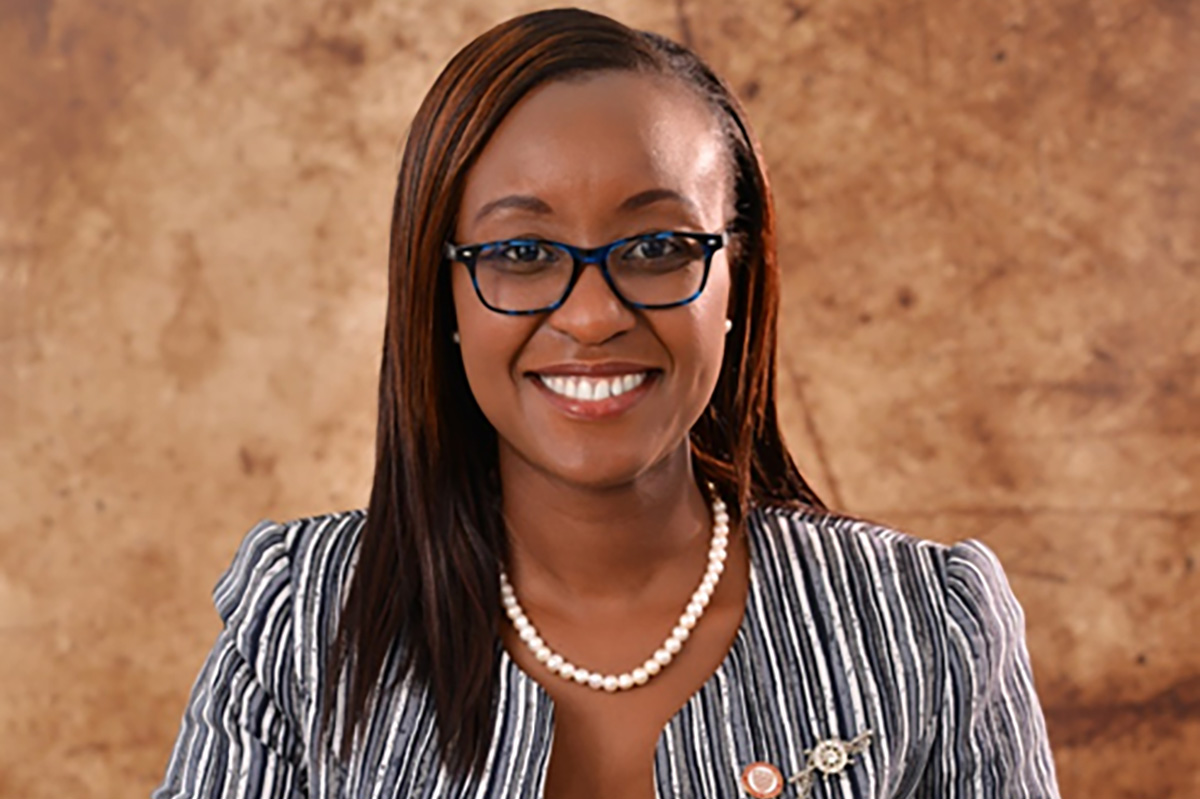
Opinions
My chance encounter with a pope and why goodness still matters
Early morning Vatican stroll turns into unforgettable memory
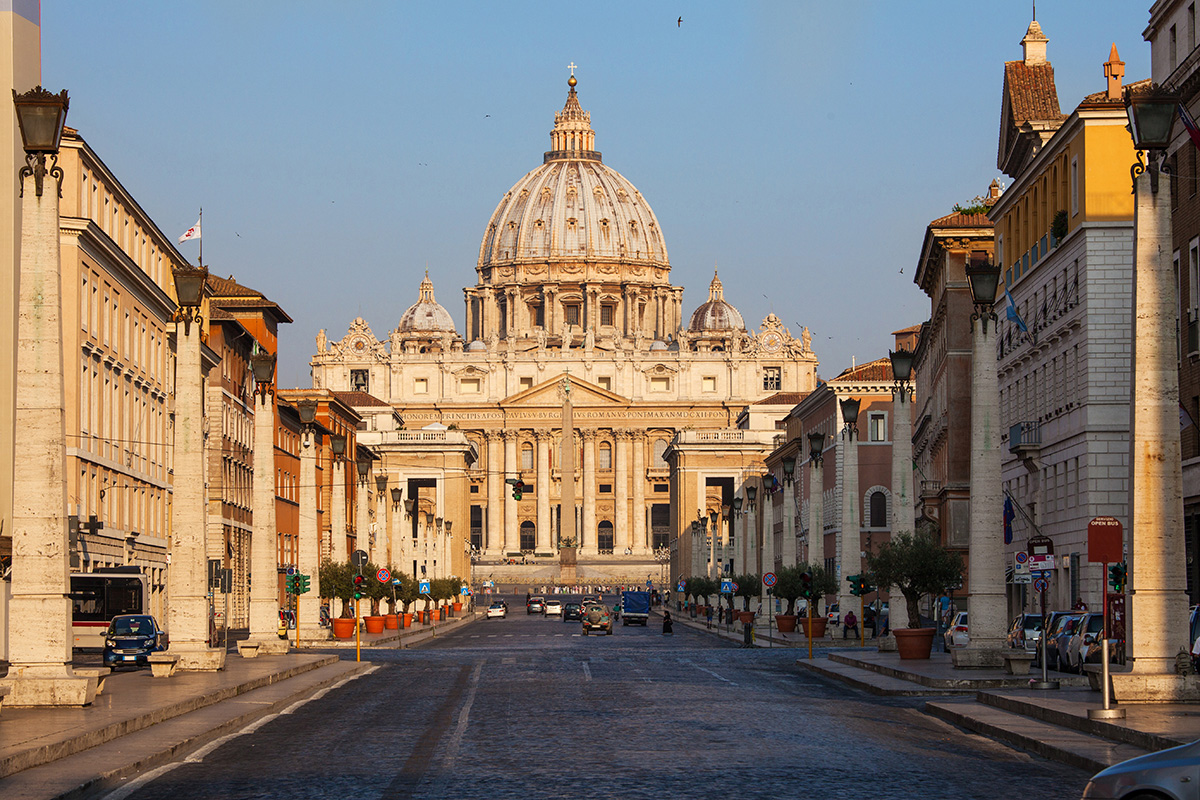
It’s not every day you meet a pope. Mine was Pope John Paul. In the recent passing of Pope Francis, and all the love and generosity of this ”People’s Pope,” I was reminded of a similar man, with a similar heart, who I had the fortune to one day meet.
There’s no real yardstick for measuring a man who’s the head of an institution that has been around since the Romans, who commands the respect of more than a billion people, and whose job it is to keep alive a 2,000-year-old message of love, hope, generosity, and salvation.
I wasn’t planning on meeting him. More like it was fated, or I’d like to believe that.
I was on a spiritual journey of my own. My schoolwork was over in Norway, and I was headed to Lebanon to write about the war there. I was a young man of 17, trying to figure out the world and how it worked — or didn’t.
It was a week before Easter when I found myself in Rome, standing at the far edge of St. Peter’s Square. As I remember, it was very early and a very beautiful morning, sometime around six or so. Even at that age, I found great solace in the solitude of the early morning. It’s as if I had the entire Square to myself, reflecting on this singular moment in time that I was alone in one of the greatest places of spiritual gathering in the world.
But I wasn’t alone. Next to the fountain where I had parked my backpack laid a man, curled up next to the stone wall, in the gentle universal snore of inebriation. I quietly cupped some water to wash my face and neck, which apparently was enough to stir the man from his sleep.
I nodded my head at him, smiled, and gave a short wave in the universal sign that we were all good and passing fellows. He groggily waved back. I was about to gather up my rucksack and head out when I saw a man strolling across the far side of the Square, about 100 yards away He was in no hurry, which intrigued me. Another soul in search of morning quietude, I thought to myself. He sauntered along, thoroughly enjoying the morning air, occasionally looking up at the sky, which was equally as intriguing.
He was a happy man who was happy to be alive. I thought it was remarkable that on that morning, there were two happy people in the world, and they were both in St. Peter’s Square.
As if a bee to a flower, the man took a direction to a small group of people, three or four more souls walking together who stopped as the man approached them. I saw one of them reach out for the man’s hand and then he kissed it. Now my curiosity turned to wonderment, trying to understand what was taking place.
My Roman fountain friend began a slow drunken babble to me as he gestured toward the small cluster that I was evidently staring at. His Italian was as good as my English, and that was the end of it. Though he continued to say, “Papa, Papa.” I queried him back, having no clue what his Papa was. Then he sat up as if to collect every ounce of clarity that still inhabited him and said, “Pope-a.” I pointed to the group. “The Pope?” He nodded his head and said, “Si. Il Pope-a” (which I later understood was a combination of the affectionate and respectful use of Papa for the Pope, combined with our English version — thus, “Pope-a”).
He smiled. I smiled. The apostle of the fountain had conveyed his message, and I was on my way to meet the pope.
Quickly, I made my way to the small gathering. I was a little unsure of how to add myself to the procession, as small as it was. My mind started to whirl with pope-laden imaginings. Would he be talking in Latin? Wearing silk robes? Would he be holding some relic of St. Peter’s golden staff?
I then slowed my walk, brought myself to the edge of the group, and there he was — the pope, John Paul himself. He was smaller than I had imagined. No staff or silk robes. He was chatting up the small group as if they were neighbors meeting in the middle of the sidewalk, exchanging news of the neighborhood or the latest sport’s scores, all in a breezy mixture of Italian and English.
He then spotted me and waved me over. I froze for a moment. With no time to study the Pope Manual of Papal Etiquettecy, I had no clue if I should kiss the ring or the hand, or shake it, or what? Not being Catholic, I was not versed on how to properly greet a pope.
I then did what any non-Catholic American 17-year-old kid on a spiritual journey would do: I combined a handshake with a nod/kiss on the hand and the biggest kid-smile I could muster. He smiled back, with the understanding of what it was to be a pope and meet a kid like me both in awe and in happiness at being together there on the Sunday morning in St. Peter’s Square.
He asked me a few questions for which I have no memory of my answers. It didn’t matter. I was talking with the pope.
There was no Instagram, or Facebook, or selfie-taking back then. Everyone somehow understood that this was a moment you stored in your mind and in your heart. To take pictures would have somehow sullied it, and everyone knew it.
John Paul was a man on a morning stroll, who shared his intimate time with a group of fellow morning seekers. He was warm, kind, and cordial — a prince of a fellow in my book. The type of man you could talk to in a bar, or on a train, or on a park bench. He practiced the generosity that is the best of the human spirit — to give without expecting anything in return. A gift of love that needs no bartering or transaction to fulfill it.
Lately, and with the recent passing of Pope Francis, I thought I needed to commemorate this memory of this day on paper. Watching how generous Pope Francis was with his love, to the children, to the sick and poor, to the downtrodden, to those who are so easily trampled over in the modern day haste to make civilization “better” and “faster,” it was no stretch to remember another man who so equally and mightily gave his heart and soul to others.
In a world where so many are seemingly trying to figure out who to hate and how to hate them, I find great solace in knowing that there are those who understand that the better angels of our nature are to be better.
On a beautiful Sunday morning, in the small tide of the oceans of history, I met with a man who helped me to remember once again that the Golden Rule is golden because it shines with goodness, grace, and generosity, and that is no small endeavor for all of us to journey toward in all of our lives.
Carew Papritz is the award-winning author of ‘The Legacy Letters’ who inspires kids to read through his ‘I Love to Read’ and ‘First-Ever Book Signing’ YouTube series.
-
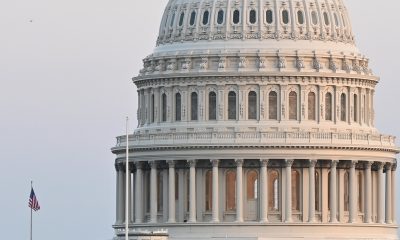
 Congress2 days ago
Congress2 days agoHRC: GOP reconciliation bill would imperil critical LGBTQ-specific programs
-

 Rehoboth Beach2 days ago
Rehoboth Beach2 days agoDel. Gov. Meyer to join Washington Blade party in Rehoboth on Friday
-

 Peru1 day ago
Peru1 day agoPeruvian activists react to Pope Leo XIV’s election
-
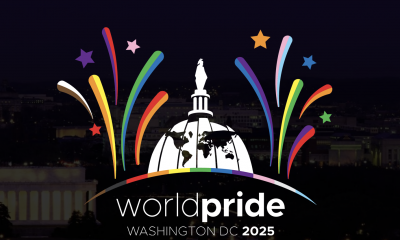
 World Pride 20251 day ago
World Pride 20251 day agoTourists, locals express concerns about WorldPride security

